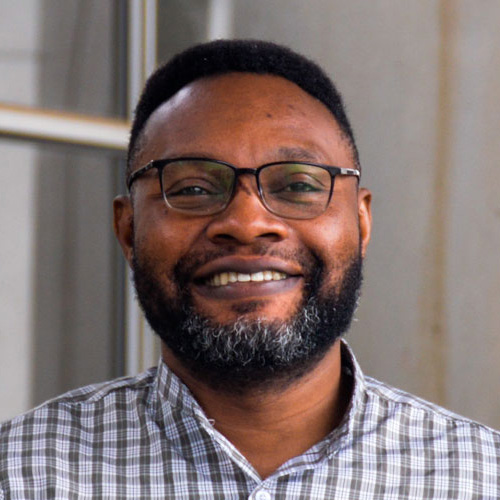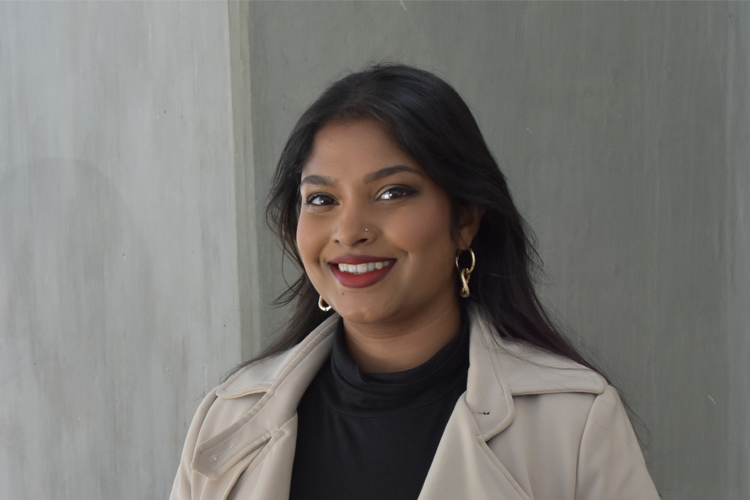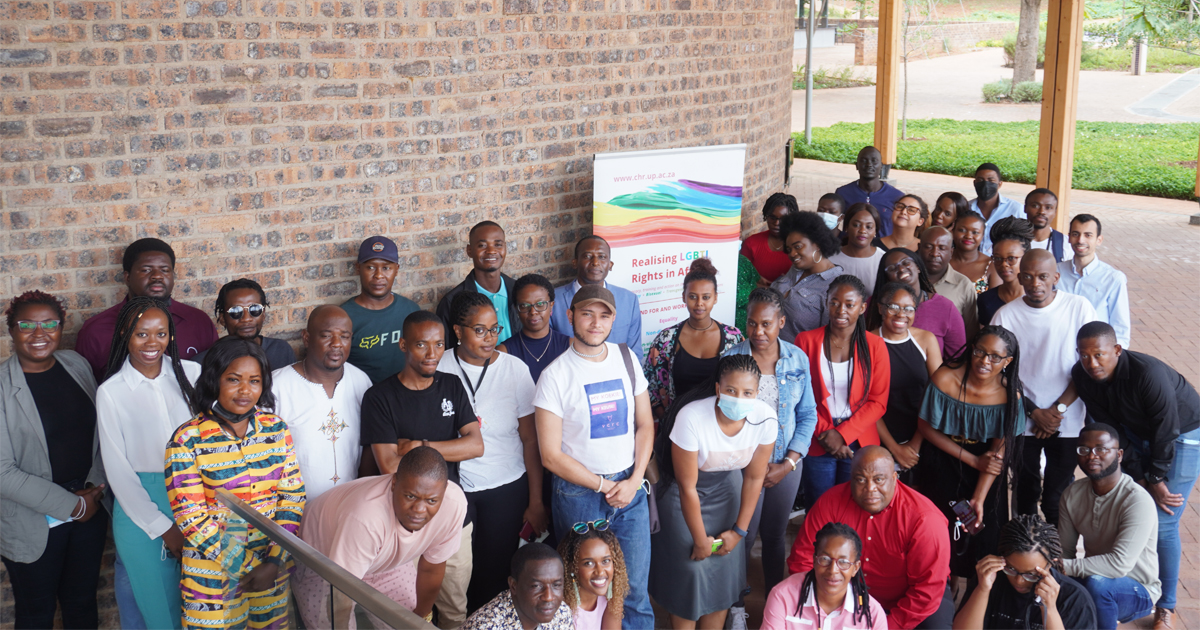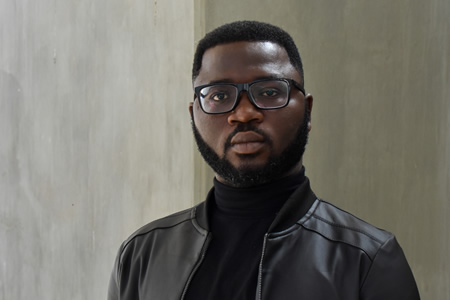The Advanced Human Rights Courses (AHRC) and the Sexual Orientation, Gender Identity and Expression, and Sex Characteristics (SOGIESC) Units at the Centre for Human Rights (the ‘Centre’), University of Pretoria (UP) recently hosted the 2022 edition of its annual short course on Sexual Minority Rights in Africa. The course was presented through both virtual and physical sessions from 21 to 25 February 2022. The course was attended by 70 participants with more than 15 presenters from both across and outside Africa. Participants included the LLM/Mphil students of the Human Rights and Democratisation in Africa (HRDA) and the Sexual and Reproductive Rights in Africa (SRRA) Masters programmes in the Faculty of Law, UP. Also in attendance were researchers, academics, judicial officers, government workers, and members of civil society. The hybrid format provided an opportunity for the Centre to accommodate a larger group of participants in an interactive, virtual classroom in conjunction with those who physically attended the course.
This year, the course provided a forum for participants to address issues relating to gender and sex identities, orientation, characteristics, and sexuality and engage in thought-provoking conversations surrounding social, political, and religious influences on how the LGBTIQ+ community is perceived across Africa. Throughout the week, participants reflected on and discussed what a decriminalisation campaign in the African context would look like and how it can be realised.
The participants had the opportunity to view a special screening of the play Born Naked at the Centurion Theatre. Born Naked is centred around Blaq Widow’s ‘coming of age story’ and her relationship with her drag mother, Queen Bling. It is a story about two queer people navigating their way through vibrant, colourful and sometimes violent spaces in South Africa. The movie Kapana was screened for the participants. The film unpacks the effects of the sodomy laws on LGBTQ+ relationships, HIV/AIDS stigma, and the impact of homophobia on gay relationships. Most importantly, it is a love story and provides a window into the lived experiences of gay men in Namibia.
Lloyd Kuveya (Assistant Director: Operations, Centre for Human Rights) welcomed everyone and introduced the Centre to the audience and highlighted the importance of the short course. Pierre Brouard (Deputy Director of the Centre for Sexualities, AIDS, and Gender) introduced different concepts related to gender and sexual diversity. Professor Charles Ngwena (Centre for Human Rights), Professor Mzikazi Nduna (Department of Psychology, University of the Witwatersrand) and Busisiwe Deyi (Department of Jurisprudence, Faculty of Law, UP) provided ancillary lectures on the impact of heteronormativity and patriarchy on diverse gender and sexual identities.
Professor Osogo Ambani (Dean: School of Law, Kabarak University, Kenya) discussed the role played by religion in regulating sexual minority rights in secular states. Khanyo Farise (Africa Advocacy Officer, Outight Action International), outline the harms of conversion therapy practices in Africa and further provided potential solutions to the issue. Dr Anastacia Tomson (Medical Doctor: Author and Transgender activist) and Ronie Zuze (Executive Director, Intersex Community of Zimbabwe) provided insights into the lived experiences of the Transgender and Intersex communities respectively.
Dr Geraldine Reymenants, General Representative of the Government of Flanders in Southern Africa, highlighted the support of the Government of Flanders for human rights and equal opportunities in Africa and for CSOs working in these areas. A panel discussion led by Yves Aerts (General Coordinator, Cavaria) and featuring Soufiane Hennani (Coordinator: Elille Collective, Morocco) and Nabonibo Albert (Coalition Facilitator, Isange, Rwanda) focused on bringing awareness to legislation and advocacy campaigns in Morocco, Rwanda and Belgium.
Dr Ayodele Sogunro (Project Manager: SOGIESC Unit, Centre for Human Rights) spoke about the history and politics of sexual minority rights within the African human rights system with a focus on Resolution 275. Professor Marc Epprecht (Departments of History and Global Development Studies, Queens University, Canada) provided a historical context to issues around the realisation of LGBTIQ+ rights in Africa.
Dr Adrian Jjuuko (Executive Director, Human Rights Awareness and Promotion Forum, Uganda) facilitated the discussion on strategic litigation and advocacy that can aid the decriminalisation of same-sex sexual practices. Sibongile Ndashe (Executive Director: Initiative for Strategic Litigation in Africa) spoke on the role of the courts and legislature in addressing SOGIESC issues in Africa. Following this, Prof Anton Kok (Department of Jurisprudence, UP) highlighted the reality of discrimination and hate crimes. Monica Tabengwa (United Nations Development Programme) discussed the legal protection of SOGIE-related rights and lastly, Landilani Banda (Doctoral Candidate: Centre for Human Rights) spoke about the impact of criminalisation and accessibility of healthcare for LGBTIQ+ people in Africa. Lloyd Kuveya and Dennis Antwi (Manager; AHRC Unit, Centre for Human Rights) offered concluding remarks on behalf of the Centre and thanked everyone for their participation.
The Centre for Human Rights is thankful to all the presenters for their time and contributions to the success of the event. The Centre also gratefully acknowledges the financial support of the General Representation of the Government of Flanders in Southern Africa and the Embassy of Kingdom of the Netherlands in South Africa as well as the institutional support from the Centre’s partner organisations.
For more information on the Advanced Human Rights Courses:

Tel: +27 (0) 12 420 4197
Fax: +27 (0) 86 580 5743
dennis.antwi@up.ac.za
Tel: +27 (0) 12 420 6398
Fax: +27 (0) 86 580 5743
basimanyane.k@up.ac.za
For more information on the protection of LGBTIQ+ rights in Africa:

Tel: +27 (0)12 420 3151
thiruna.naidoo@up.ac.za

